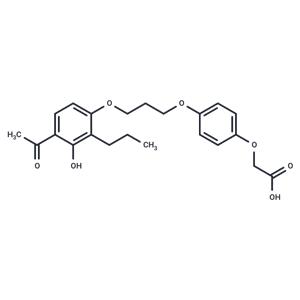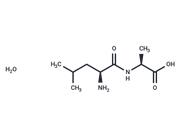| Name | L-165041 |
| Description | L-165041 is a potent and selective agonist of the nuclear receptor PPARβ and PPARδ(Ki = 9 nM, EC50 = ~500 nM ,respectively) |
| Cell Research | Cell cycle distribution was determined by flow cytometry. Synchronized HUVECs were pretreated with L-165041 (1 or 5μM) 6 h prior to the addition of VEGF (10 ng/ml). The cells were harvested 16 h after VEGF addition and washed with PBS. The cells were then incubated with buffer containing 0.1% Triton X-100 and 0.1% trisodium citrate for 30 min. Cells were rinsed with PBS and then stained with 50 μg/ml propidium iodide for 20 min at room temperature. In total, 1*10^4 cells were analyzed with the FACScan system . At least three independent experiments were performed[1]. |
| Animal Research | The effect of PPARdelta ligand L-165041 on Western diet-induced fatty liver using low-density lipoprotein receptor-deficient (LDLR(-/-)) mice. LDLR(-/-) mice received either L-165041 (5mg/kg/day) or vehicle (0.1N NaOH) with Western diet for 16 weeks. L-165041 drastically reduced lipid accumulation in the liver, decreasing total hepatic cholesterol and triglyceride content compared to the vehicle group[1]. |
| In vitro | L-165041 inhibited VEGF-induced cell proliferation and migration in human umbilical vein ECs (HUVECs). L-165041 also inhibited angiogenesis in the Matrigel plug assay and aortic ring assay. Flow cytometric analysis indicated that L-165041 reduced the number of ECs in the S phase and the expression levels of cell cycle regulatory proteins such as cyclin A, cyclin E, CDK2, and CDK4; phosphorylation of the retinoblastoma protein was suppressed by pretreatment with L-165041. The PPARδ ligand L-165041 inhibits VEGF-stimulated angiogenesis by suppressing the cell cycle progression independently of PPARδ[1]. |
| In vivo | L-165041 lowered hepatic expression of PPARgamma, apolipoprotein B, interleukin 1 beta (IL-1beta), and interleukin-6. In contrast, L-165041 increased hepatic expressions of PPARdelta, lipoprotein lipase (LPL), and ATP-binding cassette transporter G1 (ABCG1).L-165041 might be effective in preventing Western diet-induced hepatic steatosis by regulating genes involved in lipid metabolism and the inflammatory response[2]. |
| Storage | Powder: -20°C for 3 years | In solvent: -80°C for 1 year | Shipping with blue ice. |
| Solubility Information | DMSO : 50 mg/mL (124.24 mM)
|
| Keywords | L 165041 | Peroxisome proliferator-activated receptors | PPAR | L-165041 | L165041 | inhibit | Inhibitor |
| Inhibitors Related | PHYTOL | (S)-(+)-Ibuprofen | BADGE | Cinnamyl alcohol | Daidzein | Fenofibrate | Pioglitazone hydrochloride | 5-Aminosalicylic Acid | Naringenin | Fisetin | 2,3-Butanediol | Icariin |
| Related Compound Libraries | DNA Damage & Repair Compound Library | Glycometabolism Compound Library | Bioactive Compound Library | NO PAINS Compound Library | Metabolism Compound Library | Anti-Aging Compound Library | Bioactive Compounds Library Max | Anti-COVID-19 Compound Library | Anti-Cancer Compound Library | Transcription Factor-Targeted Compound Library |

 United States
United States



